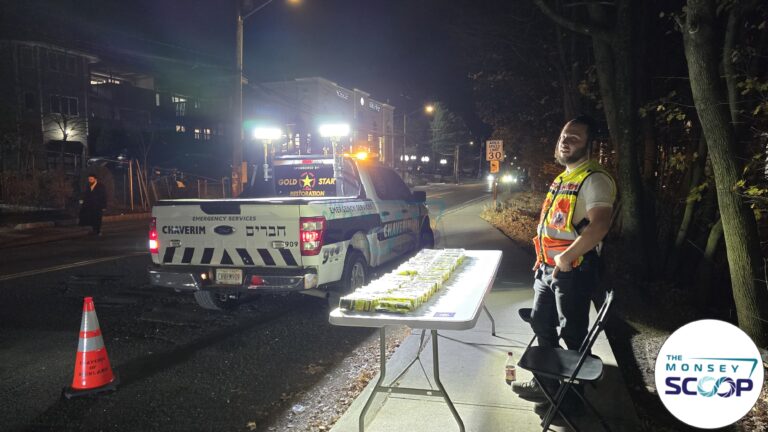 Mayor Michael R. Bloomberg and Department of Consumer Affairs Commissioner Jonathan B. Mintz announced today that the City of New York has adopted a new, tougher inspection procedure for home heating oil delivery trucks in its annual inspection of their meters to help ensure that homeowners are not overcharged for heating oil this winter. The Mayor and Commissioner Mintz also announced that the Department of Consumer Affairs has suspended more than 60 oil trucks this year, taking them off the road until they meet these standards. With the economy on the decline, today’s announcement is part of a series of initiatives announced by the Bloomberg Administration to help more New Yorkers stretch their paychecks further and weather the storm.
Mayor Michael R. Bloomberg and Department of Consumer Affairs Commissioner Jonathan B. Mintz announced today that the City of New York has adopted a new, tougher inspection procedure for home heating oil delivery trucks in its annual inspection of their meters to help ensure that homeowners are not overcharged for heating oil this winter. The Mayor and Commissioner Mintz also announced that the Department of Consumer Affairs has suspended more than 60 oil trucks this year, taking them off the road until they meet these standards. With the economy on the decline, today’s announcement is part of a series of initiatives announced by the Bloomberg Administration to help more New Yorkers stretch their paychecks further and weather the storm.
“Home heating oil prices typically rise in the winter months when demand is highest, and this winter, with the economy in decline, more families will struggle to pay their heating bills,” said Mayor Bloomberg. “While no City, even one as big as ours, can control the global factors that determine the price of oil, we can help homeowners stretch their paychecks by making sure they are getting every drop of oil they pay for.”
The Department conducts inspections on every heating oil delivery truck operating in New York City at its test station in Greenpoint, Brooklyn and at truck refueling terminals throughout the City. To ensure New Yorkers are receiving the home heating oil they pay for, the Department of Consumer Affairs inspects more than 1,000 home heating oil delivery trucks every year. Inspectors first test the oil truck meters for accuracy. In addition, inspections now replace the old split compartment test with the new product depletion test, which more accurately measures the amount of air that passes through the trucks’ pipes. This new regulation lowered the allowable amount of air that can pass when oil is being dispensed, from a maximum of 264 cubic inches to 137 cubic inches ensuring that consumers are receiving the amount of oil they purchased.
Trucks are inspected to make sure their meters accurately register how much oil they pump. After the inspection, the Department places an official seal on the meter that prevents delivery trucks from modifying their meters and shortchanging customers. An up-to-date inspection sticker is also placed on the back of the truck in a more visible location indicating to customers that the truck has recently passed inspection and has an accurate meter. Consumer Affairs checks oil trucks for faulty air eliminator devices that show a greater amount of oil was dispensed than actually received by the customer. Inaccurate meters are condemned immediately and must be repaired and retested by the Department before the trucks can operate legally.
Consumer Affairs also conducts surprise inspections of oil trucks. Inspectors on routine patrol pull over trucks delivering home heating oil and check whether they have completed their annual inspection and that the City’s seal is still intact. The average price of home heating oil in New York City this week is $3.15 per gallon compared to $3.42 the same time last year and $2.66 in 2006.
The Mayor also reminded homeowners to take the necessary steps to ensure they get the full value for their purchase:
*Always use a reputable supplier. Call 311 to check a retailer’s history with the Department of Consumer Affairs.
*Get a written contract that spells out key terms. Always get a written contract that includes costs, delivery schedule, gallons promised, services provided, and any other details that have been agreed upon. Make sure the salesperson or manager of the oil distributor signs the contract before payment.
*Before signing a contract, check for any price-changing clauses. Be sure to check how firmly your agreement locks you in if the price of oil decreases or increases, and for any other hidden costs, fees or minimum purchasing requirements that may appear in the contract. If you don’t like what you see, either renegotiate or look for a different distributor.
*Check the back of the delivery truck for an up-to-date official DCA seal. The official Department of Consumer Affairs seal certifies that the truck has been inspected and is ready to dispense fuel. If the sticker is over one year old, contact Consumer Affairs by calling 311 and visiting www.nyc.gov.
*Keep your receipt and check for necessary information. The law requires retailers to provide a receipt to customers showing exactly how much oil was received and how much was paid per unit of oil. The fuel gauge in your home can also give you a rough estimate of how much oil you have received.
*Winterize your home. Save energy and get the most for your money this winter by repairing broken doors and windows and checking radiator air valves. Visit the Department of Housing Preservation & Development’s website found on www.nyc.gov for more energy-saving tips. In addition, the Department of Buildings licenses oil burner installers. Call 311 to check whether your installer is licensed.
(Eli Gefen – YWN Queens Ops’ Desk)











3 Responses
Finally King Michael 1st is doing something worth while!!
I thought they would be inspected against terrorism.
bloomberg is really underated for the work he has put in to new yok city